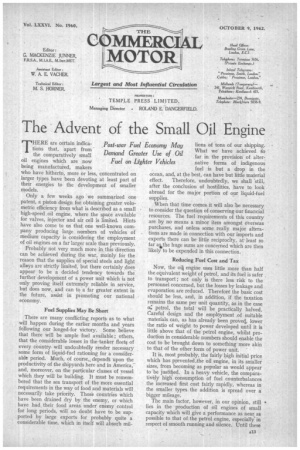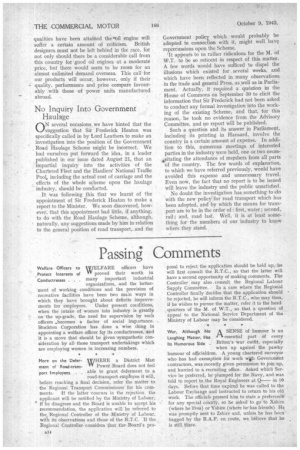The Advent of the Small Oil Engine T HERE are certain
Page 15

Page 16

If you've noticed an error in this article please click here to report it so we can fix it.
indications that, apart from ' the comparatively small oil engines which are now being manufactured, makers who have hitherto, more or less, concentrated on larger types have been devoting at least part of their energies to the development of smaller models.
Only a few weeks ago we summarized one patent, a piston design for obtaining greater volumetric efficiency from what is described as a small high-speed mil engine, where the space available for valves, injector and air cell is limited. Hints have also come to us that one well-known company producing large numbers of vehicles of medium capacity is considering the employment of oil engines on a far larger scale than previously.
Probably not very much more in.,this direction can be achieved during the war, mainly fOr the reason that the supplies of special steels and light alleys are strictly limited, but there certainly does appear to be a decided tendency towards the further development of a power unit which is not only proving itself extremely reliable in service, but does now, and can to a far greater extent in the future, assist in pomoting our national economy.
Fuel Supplies May Be Short There are many conflicting reports as to what will happen during the earlier months and years following our longed-for victory. Some believe that there will be ample fuel available ; others, that the considerable losses in the-tanker fleets of every country. will undoubtedly render necessary some form of liquid-fuel rationing for a considerable period. Much, of course„ depend § upon the productivity of the shipyards here and in America,— and, moreover, on the particular classes of vessel which they will be building. It must be remembered that the sea transport of the more essential requirements in the way of food and materials will necessarily take priority. Those countries which have been drained dry by the enemy, or which have had, their food areas under enemy control for long periods, will no doubt have to be supported by large exports for probably quite a considerable time, which in itself will absorb mil lions Of tons of our shipping. What we have achieved go far in the provision of alternative forms of indigenous fuel is but a drop in the ocean, and, at the best, can have but little material effect. Therefore, undoubtedly, we shall 'still, after the conclusion of hostilities, have to look abroad for the major portion of our liquid-fuel supplies.
When that time comes it will also 'be necessary to consider the question of conserving our financial resources. The fuel requirements of this country are by no means a minor item amongst overseas purchases, and unless some really major alterations are made in connection with our imports and exports there can be little reciprocity, at least so far althe huge sums are concerned which are then likely to be expended in this connection.
Reducing Fuel Cost and Tax Now, the oil engine uses little more than half the equivalent weight of petrol, and its fuel is safer to transport ; not only is there less risk to the personnel concerned, but the losses by leakage and evaporation are reduced. Therefor d the basic cost should be less, and, in addition, if the taxation remains the same per unit quantity, as in the case ch: petrol, the total will be practically halved. Careful design and the employment of suitable materials can, as has already been proved, lower the ratio of weight to power developed until it is little above that of the petrol engine, whilst production in considerable numbers should enable the cost to be brought down to something more akin to that of the other form of power unit.
It is, most probably, the fairly high initial price which has prevented ,the oil engine, in its smaller sizes, from becoming as popular as would appear to be justified. In a heavy vehicle, the comparatively high consumption of fuel counterbalances the increased first cost fairly rapidly, whereas in the smaller types the addition is spread over a bigger mileage. The main factor, however, in our opinion, still • lies in the production of oil engines of small capacity which will give a performance as near as possible to that of the petrol engine, especially in respect of smooth running and silence. Until these qualities have been attained the■oil engine will suffer a certain amount of criticism. British designers must not be left behind in the race, for not only should there be a considerable call from this country for .good oil engines at a moderate price, but there would seem to be room for an almost unlimited demand overseas. This call for our products will occur, however, only if their .L quality, performance and price compare favourably with those of power units manufactured abroad.
No Inquiry Into Government Haulage
nN several occasions we have hinted that the O that Sir Frederick Heaton was specifically called in by Lord Leathers to make an investigation into the position of the Government Road Haulage Scheme might be incorrect. We had ourselves put forward the idea, in a leader published in our issue dated August 21, that an impartial inquiry into the activities of the Chartered Fleet and the Hauliers' National Traffic Pool, including the actual cost of carriage and the effects of the whole scheme upon the haulage industry, should be conducted.
It was following this that we learnt of the appointment of Sir Frederick Heaton to make a report to the Minister. We soon discovered, however, that this appointment had little, if anything, to do with the Road Haulage Scheme, although, naturally, any suggestions made by him in relation to the general position of road transport, and the Government policy which would probably be adopted in connection with it, might well have repercussions upon the Scheme. it appears to us rather ridiculous for the M. of W.T. to be so reticent in respect of this matter. A few words would have sufficed to dispel the illusions which existed for several weeks, and which have been reflected in many observations in the trade and general Press, as well as in Parliament. Actually, it required a question in the House of Commons on September 30 to elicit the information that Sir Frederick had not been asked to conduct any formal investigation into the working of the existing Scheme, and that, for this reason, he took no evidence from the Advisory Committee, and no report will be published.
Such a question and its answer in Parliament, including its printing in Hansard, involve the country in a certain amount of expense. In addition to this, numerous meetings of interested parties in the industry were held, one or two necesesitating the attendance of members from all parts of the country. The few words of explanation, to which we have referred previously, would have avoided this expense and unnecessary travel. Even now, the fact that no report is to be issued will leave the industry and the public unsatisfied.
No doubt the investigation has something to Iclo with the new policy for road transport which has been adopted, and by which the means for transport are to be in the order of : first, water ; second, rail; and, road last. Well, it is at least something for the members of our industry to know where they stand.




















































